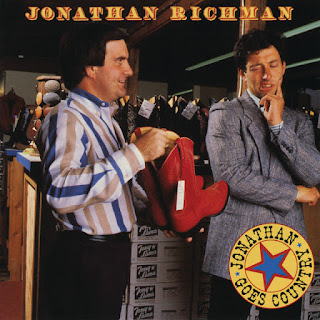Track This: Jonathan Richman's "The Neighbors" (Jonathan Goes Country Version)
Jonathan Goes Country is undoubtedly my favorite Jonathan Richman record as I return to it much more than the others, despite such classics as I, Jonathan and Back in Your Life, having many amazing tracks. Of course, The Modern Lovers records are also filled with incendiary classics. Something about Jonathan Goes Country resonates more with me than most on a song-by-song album level. Almost all the tracks have a place in showing that Richman can make country records with the best of them. The album's composition adds to its cohesion: five covers that honor the country canon while adding Richman's inimitable spin and seven originals that fit right in. He reworks three ("The Neighbors," "You're the One for Me," and "Corner Store") from his earlier albums, although you would never know he didn't write them for the album.
The record has few lows and many highs, cohesively fitting Richman's sound and style into the country idiom while retaining his lyrical standards and narrative and physical voice. (His Boston accent never distracts from the country feeling of the songs and often points to the genre's universality). Standout tracks from the covers include the pensive and forlorn version of Marty Robbins's "Man Walks Among Us" that starts off the three covers at the end of the record, a contagiously joyous cover of Ronee Blakely's "Rodeo Wind," and yet another version of the country standard, "Satisfied Mind," which seems fresh and original. Of the originals, I tend to like the tracks that show Richman's lyrical flair or showcase the band's prowess. "You're Crazy for Taking the Bus" and "Corner Store" fall into the former category because their clever wordplay tells a good story that fits country music's emphasis on historical and societal storytelling. "Since She Started to Ride" with Tom Brumley's pedal steel and "Reno" lead off the record by demonstrating the band's country chops and musicianship.
Of the highs, "The Neighbors," initially recorded for Jonathan Sings!, combines Richman's clever lyrical turns-of-phrase in a country story song that surpasses the original. The song's story is quite country in conception, as the narrator discusses the importance of the characters' relationships. The song affects an interesting call and response pattern between two probable lovers, where Jody Ross asks, "Jonathan, it's late, don't you think that I should go?" While town gossip has often been a country trope, the narrator's nonchalant response shifts the song from a tragedy-laden romance song to one that rejects town opinion: "We were just starting to talk now. It was getting good, don't you know?" Whether the narrator has an open relationship with his wife or a romantic relationship with the question asker is not the issue. The narrative revolves around the narrator's attitude as he thinks that only his wife and those in the song should have a say in their relationship. The song progresses as Ross sings, "But if I leave here in the morning, what will the neighbors tell your wife?" Richman interjects "Yeah," continually reframing the conversation and allowing his wife additional agency. He reinforces the attitude that the neighbors have no say: "Well, my wife knows me by now. So there's no need to let the neighbors run my life." While the narrator reinforces connections between his wife and himself, he creates a possible disconnect between himself and his "lover," postulating that they possibly have a more transient connection and should just have fun. Thus, the song covers one of country music's most common narrative arcs: complicated relationships that cause people to question their social status.
Musically, the call-and-response pattern meshes well with the subtle instrumentation in a song that allows for multiple interpretations and viewpoints. Trebly Flamenco-style acoustic guitar flourishes introduce the song before an accordion and percussion come in to slowly accentuate the vocal pattern. As you listen to the song, ponder the changes in each relationship and the narrator's need to brush off connections that would be deleterious in any other country song. The vocals are high in the mix, and listeners could feel like they are part of the conversation. If nothing else, they can understand the confusion that the relationship creates for the neighbors and how they view the narrator and his wife.




Comments
Post a Comment